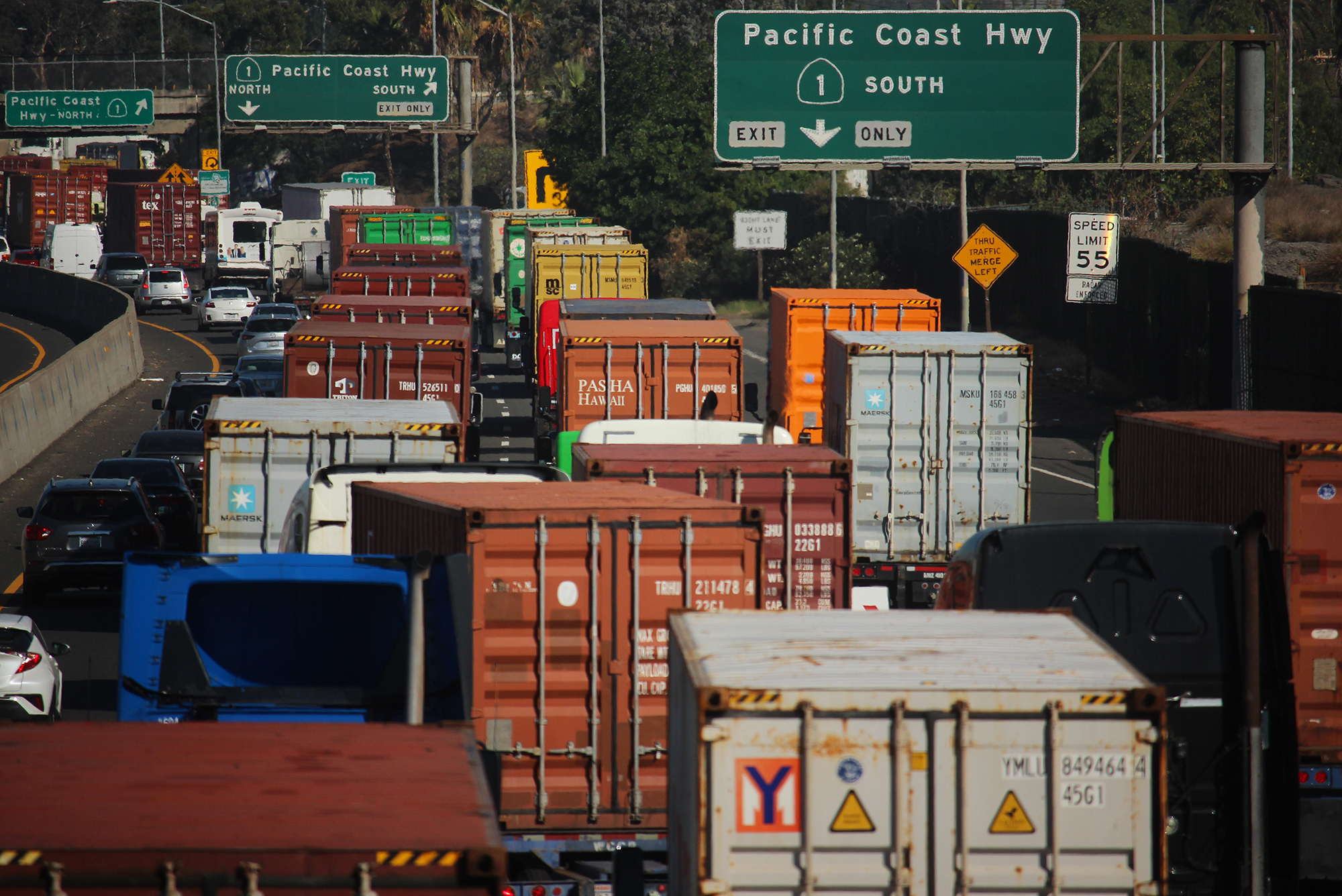
After years of planning, study and community input, the Long Beach Board of Harbor Commissioners Monday voted unanimously to approve the implementation of a fee for older, pollution-producing trucks at the Port of Long Beach, including a controversial exemption for natural gas vehicles.
The Clean Truck Fund Rate program charges a fee for every shipping container moved into and out of the port complex aboard diesel trucks. The fee—$10 for each 20-foot equivalent unit, the standard measure for a container—will be charged to cargo owners and used to fund truck initiatives to reduce emissions with the ultimate goal of reaching zero emissions by 2035 at the port.
Zero-emission trucks will be exempt from the fee. Collection will begin April 1, 2022.
The item also included a temporary exemption for natural gas-powered trucks purchased and registered with the port on or before Dec. 31, 2022, with an expiration date of Dec. 31, 2031. But the item was approved with amendments from board Vice President Sharon Weissman, which exempt natural gas trucks through Dec. 31, 2034 if purchased before Dec. 8, 2021, if owned by the original purchaser and through Dec. 31, 2031 for trucks purchased by July 31, 2022 that are registered with the port within 30 days of receipt from the manufacturer.
“We are stewards of the port for all of California and we must use our resources wisely and do whatever we can to reduce emissions today,” Weissman said during the meeting, noting that natural gas trucks significantly reduce greenhouse gas and nitrogen oxide (NOx) emissions. “I cannot support the delay of reducing harmful emissions any longer.”
The natural gas exemption was at the heart of controversy after a joint investigation by the Los Angeles Times and news outlet Floodlight in partnership with the Guardian found that gas companies paid at least 20 local residents to push for natural gas trucks during public meetings and press conferences in 2017. A company called Method Campaign Services was paid at least $10,000 by Clean Energy Fuels Corp., which owns natural gas fueling stations, according to the Times report.
At least some of the residents were told they were “standing up for sustainability” as part of an environmental campaign, the Times reported, unaware they were taking the side of fossil fuels.
“Sadly, the Port of Long Beach has been the target of a deceptive gas industry astroturf campaign, which has been driving this false solution since 2017,” Long Beach resident Elliot Gonzales said in a statement. “Those of us who breathe pollution from the port day in and day out have been clear from the beginning that we want the port to use this revenue source to support the transition from diesel to clean, electric trucks.”
In May, commissioners approved a lifetime exemption from the fee for natural gas trucks. After public pushback, however, the board added the sunset date for the exemption.
As of August, there were 19,994 trucks in the Port Drayage Truck Registry, according to a staff presentation. Of those, 9,384 trucks are 2014 or newer, which make 48% of moves. About 70% of registered trucks meet 2010 EPA standards.
There are 911 natural gas trucks operating at the port, performing 5% of moves. Only 28 battery-electric trucks are registered with the port.
The rate collection mechanism is still being established but is slated for completion in March, according to Monday’s presentation. Based on current cargo volumes, the fee is expected to generate about $90 million for the ports of Long Beach and Los Angeles combined annually in the early years, according to port documents.
Port of Long Beach Executive Director Mario Cordero said the port would first prioritize incentives and programs to increase the number of natural gas trucks that operate within the port, with 10% set aside for zero-emission trucks. At the Port of Long Beach, upward of 6,000 outdated diesel trucks must be replaced within the next two years.
“The choice today is not between low-NOx and zero-emission trucks, it’s between low-NOx trucks and diesel,” Cordero said during the meeting, noting that those trucks could be replaced with newer diesel trucks rather than widely available natural gas trucks unless the exemption was included. “We have chosen to emphasize the low-NOx option to reduce emissions today and not wait for tomorrow.”
Zero-emission trucks are not widely commercially available, which makes a faster transition impossible, Cordero said. The use of natural gas trucks in the interim is the best option to fill the gap, while reducing emissions when compared to diesel trucks.
“Zero emission is coming,” Cordero said. “But there is an alternative now.”
Since the San Pedro Bay ports implemented the Clean Truck Program in 2008, diesel emissions have been cut by as much as 97% compared to 2005 levels, according to a Port of Long Beach announcement issued after the vote.
Public comment was a mix of support and opposition of the natural gas exemption for various. Many in favor of the exemption were from within the fossil fuels industry, such as fueling station operators, trucking associations and truck manufacturers. Many felt the deadline for purchasing and registering a natural gas truck was not feasible due to supply chain issues that are slowing the delivery of trucks.
Those opposed to the exemption were local residents and environmental advocates that, like Gonzales, urged the commission to prioritize zero-emission trucks, noting that natural gas will not solve the pollution issues that have plagued people living in port-adjacent areas, including along the 710 Freeway.
“We have been treated like a sacrifice zone for so many years,” Gonzales said. “We deserve real, clean energy solutions that will deliver immediate air quality benefits, not more polluting technologies pushed by the fossil fuel industry at the expense of our health.”
